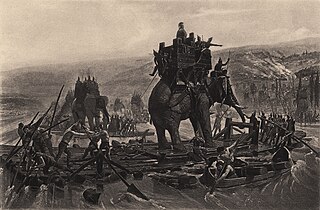
The 2nd century BC started the first day of 200 BC and ended the last day of 101 BC. It is considered part of the Classical era, although depending on the region being studied, other terms may be more suitable. It is also considered to be the end of the Axial Age. In the context of the Eastern Mediterranean, it is the mid-point of the Hellenistic period.

The 3rd century BC started the first day of 300 BC and ended the last day of 201 BC. It is considered part of the Classical Era, epoch, or historical period.
This article concerns the period 229 BC – 220 BC.

This article concerns the 200 BC decade, that lasted from 209 BC to 200 BC.
This article concerns the period 159 BC – 150 BC.
This article concerns the period 269 BC – 260 BC.
This article concerns the period 259 BC – 250 BC.
This article concerns the period 249 BC – 240 BC.
This article concerns the period 239 BC – 230 BC.
This article concerns the period 219 BC – 210 BC.
This article concerns the period 179 BC – 170 BC.
This article concerns the period 189 BC – 180 BC.
This article concerns the period 199 BC – 190 BC.
Year 221 BC was a year of the pre-Julian Roman calendar. At the time it was known in Rome as the Year of the Consulship of Asina and Rufus/Lepidus. The denomination 221 BC for this year has been used since the early medieval period, when the Anno Domini calendar era became the prevalent method in Europe for naming years.
Year 196 BC was a year of the pre-Julian Roman calendar. At the time it was known as the Year of the Consulship of Purpureo and Marcellus. The denomination 196 BC for this year has been used since the early medieval period, when the Anno Domini calendar era became the prevalent method in Europe for naming years.
Year 191 BC was a year of the pre-Julian Roman calendar. At the time it was known as the Year of the Consulship of Nasica and Glabrio. The denomination 191 BC for this year has been used since the early medieval period, when the Anno Domini calendar era became the prevalent method in Europe for naming years.
Year 188 BC was a year of the pre-Julian Roman calendar. At the time it was known as the Year of the Consulship of Messalla and Salinator. The denomination 188 BC for this year has been used since the early medieval period, when the Anno Domini calendar era became the prevalent method in Europe for naming years.
Year 219 BC was a year of the pre-Julian Roman calendar. At the time it was known as the Year of the Consulship of Paullus and Salinator. The denomination 219 BC for this year has been used since the early medieval period, when the Anno Domini calendar era became the prevalent method in Europe for naming years.
Year 157 BC was a year of the pre-Julian Roman calendar. At the time it was known as the Year of the Consulship of Caesar and Orestes and the Seventh Year of Houyuan. The denomination 157 BC for this year has been used since the early medieval period, when the Anno Domini calendar era became the prevalent method in Europe for naming years.

